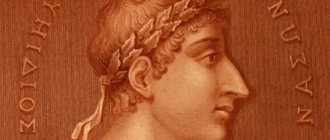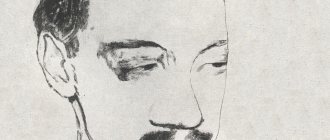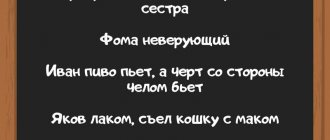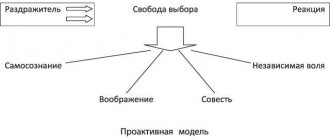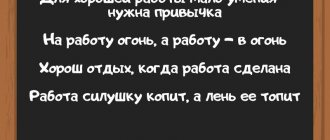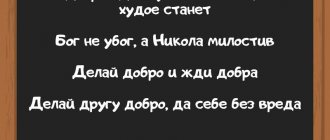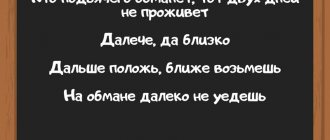Origin
These words are spoken by Faust (Part 1, Scene 4 “The Cabinet of Faust”), outlining his terms of the deal with the devil (Mephistopheles).
Mephistopheles will fulfill all of Faust's desires, but one day the moment will come when he will have nothing left to desire, he will lose the meaning of life. Faust is afraid that having reached this state, he will suffer. Therefore, Faust asks Mephistopheles to interrupt his earthly existence when he reaches the highest happiness and wants it to last a little longer. When Faust utters the words “Stop, just a moment!”, Mephistopheles must stop Faust’s earthly life and take him with him to the underworld: A free people on a free land I would like to see on such days.
Then I could exclaim: “A moment!
Oh how wonderful you are, wait! The traces of my struggles are embodied, And they will never be erased.” And anticipating this triumph, I am now experiencing the highest moment. But as is usually the case with translations of foreign fiction, formally in Goethe’s work this phrase looks somewhat different:
Original: “Verweile doch! “Du bist so schoen!” Literal translation: “Wait a little! You are so wonderful!
The aphoristic form of expression known to us belongs to the little-known poet Alexander Yakhontov. The only collection of the poet and translator's lifetime was published in 1884.
Yakhontov was a lyceum student, and the poem is dedicated to the Lyceum, specifically, to the famous lyceum monument, where once stood a bust of Alexander I with the inscription Genio Loci, and then the bust disappeared, and only the pedestal remained. The last line of the poem is “Stop, moment, you are beautiful!” - an allusion to Faust, but not a quotation from it.
Thus, we can say that the formal author of the aphorism “Stop, moment, you are wonderful!” is Alexander Nikolaevich Yakhontov, but having become a catchphrase, it became firmly established in the work “Faust” by Johann Wolfgang von Goethe, to whom this idea belongs.
Text of the book “Stop, moment! You are wonderful"
Johann Wolfgang Goethe Stop, just a moment! You're wonderful
© "Tsentrpoligraf", 2018
© Artistic design, "Tsentrpoligraf", 2018
Preface
The name of Johann Wolfgang von Goethe is known even to those who have not read his works. “Faust” and “The Sorrows of Young Werther” have become household names; quotes from “Faust” are used even by those who are not aware of it. Who was the author of these wonderful works and how did he live his life, which the best translators, poets and writers undertake to translate into different languages of the world?
Johann Wolfgang was born on August 28, 1749 in the German market city of Frankfurt am Main in the house that is now the Goethe House museum on Großer-Hirschgraben.
His grandfather Friedrich Georg Goethe came to the city from Thuringia. At first he worked as a tailor, then opened a tavern. A successful second marriage brought him both a hotel and capital from his wife, so his children and grandchildren did not need money.
Johann Caspar was the second son of Friedrich Goethe, he graduated from the university and defended his dissertation in Latin, but he never engaged in any public activities, preferring private life to it.
At the age of 39, he married 17-year-old Katharina Elizabeth Textor, the daughter of the city elder and chief judge.
Johann Wolfgang Textor, her father, in 1748, being neither a patrician nor a scion of the ancient city nobility, achieved the highest position in the city-republic, becoming "imperial and city Schultgeis", that is, the permanent head of the judicial department and chairman of the city council, and at the same time, he was also the viceroy of the German-Roman emperor, whose subjects were the Frankfurt residents.
So Johann was born into a wealthy family that belonged to the city elite. From 1756 to 1758 he attended public school, then studied at home with his sister Cornelia. Subjects included German, French, Latin, Greek, Yiddish, Hebrew, English, Italian, science, religion, drawing, piano and cello, horse riding, fencing and dancing. At Christmas 1753, Johann Wolfgang received a puppet theater from his grandmother as a gift, where he and his friends performed performances based on his children's plays.
There was a large library at home, about 2000 volumes, and, of course, the boy read constantly.
In the autumn of 1765, Johann went to Leipzig to study law at the university. However, he was more interested in Christian Gellert's lectures on literature. In addition, the former art teacher Adam Friedrich Ezer opened an art academy at the university in 1764 and introduced Goethe to the famous art critic Winckelmann. Many years later, Goethe would write a large study about him entitled “Winckelmann and His Time.”
In Leipzig, Goethe fell in love with the innkeeper's daughter Käthen Schönkopf, began writing poetry again, and even compiled a collection of 19 poems, illustrated by his friend Ernst Wolfgang Barisch.
In 1769, a second collection of poems was published with the title “New Songs.”
In July 1768, Goethe began bleeding due to an exacerbation of tuberculosis, and in August he returned home to Frankfurt without a degree. In April 1770, having recovered his health, he went to continue his studies, but to Strasbourg. Here he met young writers, later prominent figures of the era of Sturm and Drang (Lenz, Wagner), and became interested in folk poetry.
While visiting his fellow student, in the family of Pastor Brion, Goethe fell in love with Friederike Brion, to whom he dedicated lyrical poems (“Hello and Farewell,” “May Song,” “Steppe Rose”). Frederica, whom everyone already considered Goethe's fiancée, learned about the breakup from a letter. The love story of Goethe and Friederike Brion formed the basis of Franz Lehár's 1928 operetta Friederike.
In the summer of 1771, Goethe presented his dissertation for defense, where he examined the issue of interaction between the state and the church. The theologians of Strasbourg were offended by such ideas and called Goethe a “mad champion of religion”; the dean insisted not to allow the student to defend himself. The university offered Goethe to purchase a license, and Goethe submitted 56 theses for defense.
For the next four years, Goethe practiced law in Frankfurt. However, literature and journalism were more important to him. The play Götz von Berlichingen with the Iron Hand (1773) brought him literary success and became a manifesto for the Sturm und Drang movement.
In May 1772, Goethe, at the insistence of his father, went to the city of Wetzlar to undergo legal practice. His friend's fiancee Charlotte Buff did not return Goethe's feelings, and he left with nothing. A year and a half later, he wrote a book about this, “The Sorrows of Young Werther.” The novel was a resounding success and made the author famous throughout Europe.
At Easter 1775, Goethe's engagement to the daughter of a Frankfurt banker, Lili Schönemann, took place. However, due to religious and other reasons, the engagement was called off in October on the initiative of the bride's mother. In desperation, Johann Wolfgang accepted the invitation of the 18-year-old Duke Karl August and moved to the Weimar court, where he remained forever. Goethe was entrusted with the palace theater and appointed advisor to the duke with an annual salary of 1,200 thalers.
Work left little time for creativity. Goethe dealt with issues of mining, forestry and agriculture, geology and mineralogy, botany and osteology.
On June 23, 1780, Goethe was initiated into the Amalia Masonic Lodge in Weimar. Goethe's Masonic receipt itself is dated February 11, 1783. Goethe was an ardent supporter of Freemasonry until the last days of his life, composing hymns and speeches for his lodge.
In the mid-1780s, he had a creative and emotional crisis - Goethe was burdened by court life, the burden of authority, his relationship with Charlotte von Stein was not developing, and no new works were being written. Almost secretly from everyone, Goethe went to Italy incognito under the name of Johann Philipp Möller.
He visited Verona, Vicenza, Venice, Rome, Naples, Florence, Siena, Sicily, Parma, Milan. New impressions change his mood.
In Italy, Goethe felt a creative surge and completed Torquato Tasso, Iphigenia, and Egmont. Based on his diaries, he described his “Italian Journey” in 1813–1817.
Upon returning to Weimar, Goethe began a love affair with 23-year-old milliner Christiane Vulpius. Due to her origin, she could not appear in high society, but she bore Goethe several children. At the same time, Goethe tried to officially marry 21-year-old Henriette von Lütwitz, but her father did not consent to the marriage. Only 18 years later, on October 14, 1806, Johann Wolfgang and Christiane officially got married.
In 1792, Goethe accompanied Duke Karl August, who commanded a regiment in the Prussian army, during the Austro-Prussian campaign against revolutionary France. He witnessed the battle of Valmy and, according to his memoirs, after the battle he told the Prussian officers: “Here and from now on a new era of world history began, and you have the right to say that you were present at its birth.”
Wilhelm Meister's Years of Study is Goethe's second and longest novel. Its publication in 1795–1796 marked the emergence of a new literary genre - the novel of education.
In 1797, Goethe and Schiller held a competition in writing ballads (“the year of the ballads”), thus giving impetus to the development of the genre. Among the ballads written by Goethe are “The Corinthian Bride”, “The Treasure Hunter”, “God and the Bayadère”, “The Sorcerer’s Apprentice”.
Goethe's most famous creation is his tragedy Faust, on which he worked throughout his life, from 1774 to 1831. According to the poet’s diary entries, he completed the “main work” of his life in mid-July 1831. The poet put an end to the second part of Faust on July 22, and in August the manuscript was sealed in an envelope with instructions to open and publish it only after his death. At the beginning of March 1832, while walking in an open carriage, Goethe caught a cold: catarrh of the upper respiratory tract and, presumably, a heart attack led to his death on March 22, 1832. The second part of Faust was published in the same year as the 41st volume in the Collected Works.
In addition to literary works, Goethe also wrote works on the natural sciences.
He published a number of works on the comparative morphology of plants and animals, physics (optics and acoustics), mineralogy, geology and meteorology. It was Goethe who coined the term "morphology". In his work “An Experience on the Metamorphosis of Plants” (1790), he traced signs of similarity in the structure of various plant organs. In the field of comparative anatomy of animals, Goethe is responsible for the discovery of the premaxillary bone in humans (1784, published in 1820 simultaneously with other anatomical works in the memoir “Questions of Morphology”). Goethe’s disagreement with Isaac Newton, who discovered the complex composition of white light, expressed in his work “On the Theory of Colors” was erroneous, but Goethe’s views on color theory retain historical significance, mainly in the field of physiology and psychology of vision.
The attitude of his contemporaries towards Goethe was very uneven. The greatest success befell “Werther,” although educators in the person of Lessing, paying tribute to the author’s talent, accepted the novel with noticeable restraint as a work preaching lack of will and pessimism. Romantics had two views about the poet. Immersed in the classical world of Goethe, a cruel war was declared. At the same time, they treated him as the author of “Götz”, “Werther”, “Faust”, fairy tales and especially “The Years of the Study of Wilhelm Meister” with exceptional reverence.
P. J. von Cornelius. Faint Gretchen
In Russia, many poets turned to Faust; in total there are more than 20 translations, although some translated only certain parts that most interested them.
A. S. Griboyedov was the first to turn to this work. In 1825, his translation of an excerpt from the “Theatrical Introduction” to Faust was published in the Polar Star magazine. Griboedov, in his translation, shows in the Director’s words a satire on modern society as it appears in theater seats. This translation was made in the spirit of Chatsky’s accusatory monologues. Therefore, the translation was not very accurate.
Over the next 10 years, several translations of excerpts from Faust appeared in Russian magazines. These were the song of Gretchen at the spinning wheel, the ballad “The King of Fula.” Outstanding Russian poets include D. Venevitinov and F. Tyutchev, who translated Faust’s monologue in the Forest Cave. Tyutchev also translated The Ful King. There were other translations as well.
In 1838, a translation of the first part of Faust by E. Huber was published as a separate book. At the same time, the censors removed as many as three hundred lines from the work. "Prologue in the Sky" was completely excluded. They also crossed out those lines where Faust, translating the Gospel of John, discusses what came first - the word or the deed. Accordingly, all discussions about the church were removed.
Subsequently, Guber's friend A.G. Tikhmenev published the text of the translation in 1859 with the restoration of almost all the places crossed out by censorship. This translation has been reprinted several times. Huber retold the second part of Faust in prose and published it that way. He gave some passages in poetic translation. This work appeared in 1840 in the Reading Library.
In 1844, M. Vronchenko made another translation of the first part. It was closer to the original and more poetic. In those cases when he deviated from the original, Vronchenko gave an accurate prose translation in the notes. But due to censorship restrictions, some parts had to be softened or remade. All these changes were specified in the notes. The second part is also presented in prose.
V. Belinsky, while working at Otechestvennye zapiski, encouraged Alexander Strugovshchikov, whom he considered one of the best translators of poetry, to translate Faust. This was a success, and his translation of the first part of Faust was published in the Sovremennik magazine. For the next half century, this translation was considered the best.
In 1851, A. Ovchinnikov published the first complete translation of the second part of Faust in Riga, but there were some linguistic innovations, and the translation gave rise to ridicule.
Many other translators in the 19th century presented their versions of the first part of Faust, but they did not become classics.
In the last quarter of the 19th century, complete poetic translations of both parts appeared. One of them belongs to Afanasy Fet and was made in 1882–1883. He tried to maintain the dimensions of the original poems, observe the alternation of rhymes and other details. However, this meant sacrificing meaning in many places. Because of this, Fet’s work did not receive recognition and was not republished in the 20th century.
Among the translations of the second half of the 19th century, the most significant and famous is that made by N. A. Kholodkovsky for the Collected Works of Goethe, published in 1878. Zoologist scientist N.A. Kholodkovsky created the most accurate translation and sought to improve it with each reissue.
When M. Gorky headed the World Literature publishing house, the poet Mikhail Lozinsky was assigned to edit Kholodkovsky’s translation, and this new version was reprinted several times. It was Kholodkovsky who owned the phrases that became catchphrases: “Stop, just a moment, you’re beautiful!” and “Only he is worthy of life and freedom who goes to battle for them every day.”
At the beginning of the 20th century, Symbolist poets began translating Faust. K. Balmont published several excerpts from the first part, and Valery Bryusov created a complete translation. The first part was published in 1928, and the fifth act of the second part was published in 1932 in Literary Heritage.
In 1953, a translation of Faust appeared, created by Boris Pasternak. After some revisions, he republished it in 1955, and this version became the best known.
It is believed that Kholodkovsky's translation is closest to the original in meaning, and Pasternak's translation is more poetic.
In the sections below, quotes from “Faust” are given precisely in B. Pasternak’s translation.
About people
* * *
Having already become a superman in your dreams, having forgotten your duty, you think of others as fools. But why are you elevated above others? Know yourself and you will be at peace with them. "Dedication"
* * *
It is absurd to call on fools to correct themselves! Children of reason, trust the speech - It’s better to leave the fool in the cold! "Kofta Songs"
* * *
By renewing, everyone must be captivated by the new every day. “Isn’t it possible to keep the name…”
* * *
In the common pile of people, those who are stupidest glorify themselves. “Power, you feel it yourself...”
* * *
Great or small is man, He weaves his own world for himself all his life. "Great or small..."
* * *
I was a man in the world, That means I was a fighter! "Inlet"
* * *
A person, satisfied with himself, Waits for peace of mind In heaven, as in life below. "Highest and Supreme"
* * *
But in one thing all people are alike: Selfishness cripples everyone. “One is French, one is British...”
* * *
Whoever, having comprehended the course of centuries, has not built his life intelligently, lives in the dark, lived a day - and wait for another. “One is French, one is British...”
* * *
The two-legged race is good for everyone, But there is trouble in the world: If that one did something, Immediately after them are these! "To those who call us to good..."
* * *
A person can't go wrong with talent. Combine only in each role Imagination, feeling, intelligence and passion And a sufficient share of humor. "Faust"
* * *
The god of the universe, man is such, as he has been from time immemorial. "Faust"
* * *
Only those who can apply the inheritance to life are worthy of inheriting. But pathetic is the one who accumulates dead rubbish. "Faust"
* * *
Out of laziness, a person falls into hibernation. "Faust"
* * *
Let happy fate and unhappy fate alternate throughout the entire century. Man finds himself in tirelessness all the time. "Faust"
* * *
I am also familiar with loneliness. When I began to judge more soberly, the number of distant People doubled. "Faust"
* * *
I don’t notice a change in you, but I have changed completely. "Faust"
* * *
It is great audacity to pretend to mean something, turning into nothing. "Faust"
* * *
We drape in every way Our lack of will, cowardice, weakness, laziness. The burden serves as a screen for compassion, And conscience, and any rubbish. "Faust"
* * *
Go, eccentric, trumpeting about your genius! What would happen to your boastful self-importance, If only you knew: there is no thought in the slightest degree that was not known before you! "Faust"
* * *
How unpleasant the truth is for young people, When we speak it to their faces. Once upon a time we drove in the beginnings. Life after confirms that not a single step. "Faust"
* * *
As a great man, you modestly shirk praise, As if you yourself were too small, And the exploits of others are enormous. "Faust"
* * *
But there are also grateful hearts. A drop of gratitude will outweigh the darkness of insults, no matter how annoying they may be. "Faust"
* * *
You are destined to go crazy. In the end, no matter how the wort ferments, the result is wine. "Faust"
* * *
Everything before him is covered in darkness, Everything serves as a sign for the unkind, And wealth floats past Such an unsociable person. The house is full - he is starving, he saves for future use, he is malnourished, he cannot sit quietly, a rainy day worries him. The fateful future does not give him peace. "Faust"
* * *
For those who are wise, the impossible is possible. "Faust"
* * *
The disturbing doubt that our thoughts are only our personal property, which attacks us every time when others express beliefs that contradict ours, softens and even completely disappears as soon as we recognize ourselves in others.
"Introduction to the Propylaea"
* * *
Even the same man is not always equal to himself in his views and opinions, and earlier convictions must so often give way to later ones.
